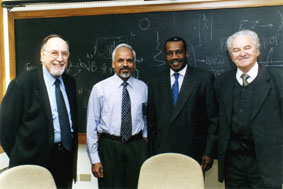Personal tools
News from ICTP 108 - What's New

ICTP and ITU have forged a partnership to advance the frontiers of the telecommunication revolution in developing countries.
Dot Dash Digital
Fatima, a 30-year-old
Nigerian woman, sits beneath a cloth canopy that screens both
her and her merchandise from the blistering sun. The stand has
been her place of business for more than a decade.
Sales have been good for the past several days and her stock of
brightly coloured napkins, scarves and table cloths is running
low. So she takes her cell phone from her handbag and places a
call to her supplier. Within an hour, he delivers her order. Customers,
meanwhile, have continued to come and go.
Just last year, if Fatima needed to restock her merchandise, she
would have been forced to close her stall and walk to her supplier,
placing her order in person. Two hours of work would be lost.
That would mean fewer sales and less money to take home.
When you're living on US$3 a day, every sale counts and, with
her cell phone in hand, Fatima has now been able to make more
sales and earn more money, more often.
Hamadoun I. Toure, director of the International Telecommunication
Union's (ITU) Telecommunication Development Bureau (BDT), likes
to tell this story when describing how new information technologies
have transformed the lives of everyday people in the world's poorest
nations.
And he has the numbers to back him up. In sub-Saharan Africa alone,
mobile phone use has increased 300 percent a year for the past
five years--a reflection of the broad appeal of this technology.
ITU has sought to advance the use of cell phones and other new
information technologies by seeking regulatory reform and encouraging
investment from the private sector.
This isn't the first time that Toure's organisation has offered
to steer new information technologies in the right direction.
Indeed the venerable 140-year-old institution was created just
20 years after the discovery of the telegraph. At the dawn of
the first telecommunications revolution, ITU's goals were twofold:
to develop universal standards that would facilitate the use of
the new technology and to promote widespread global access to
a breakthrough communication tool.
ITU has continued to pursue these goals throughout its history
and never more so than in the past two decades. Indeed bridging
'communication divides' has been at the heart of ITU's mandate
ever since its inception. In effect, efforts to narrow the 'dot
and dash divide' symptomatic of the telegraph era have been replaced
by strategies to reduce the 'digital divide' characteristic of
our computer age.
With the help of ICTP, Toure now hopes to lend a helping hand
to universities in the developing world in their efforts to become
full and equal partners in the use of email and the internet.
This February, he visited ICTP to sign a 'cooperation agreement'
with ICTP's director K.R. Sreenivasan. The agreement calls for
the institutions to "collaborate for the advancement of resources
and research and develop capabilities in the field of telecommunication
science and technology in developing countries."

Sandro M. Radicella, Katepalli R. Sreenivasan, Hamadoun I. Touré and Ryszard Struzak
Toure hopes that "this new partnership will help meld ITU's
'connectivity' capabilities--through its strong ties to governments,
private sector telecommunication companies and financial institutions--to
ICTP's 'training and research' capabilities."
"ICTP," notes Sandro Radicella, head of the Centre's
Aeronomy and Radiopropagation Laboratory (ARPL), "has been
conducting extensive training activities for communication researchers
and technicians from the developing world for more than a decade."
The Centre has also taken a lead role in the transfer of knowledge
and open-source technology to universities and research institutions
throughout the South. And, through its eJournals Delivery Service,
launched in 2001, it has sought to bring up-to-date scientific
publications to scientists in more than 100 countries, including
some of the world's least developed countries (see "Ready Access," News from ICTP,
Spring 2003, p. 2, and "ICTP's eJournals Delivery Service," News
from ICTP, Autumn 2001, p. 2).
"Our partnership with ICTP," says Toure, "is designed
to help ITU achieve one of its major objectives: to cyber-connect
all universities by 2015 and, equally important, to use this university-wide
web to provide valuable information for improving university curricula
and research, especially in the developing world."
In big ways and small, new communication technologies are radically
transforming our world. Now ITU and ICTP are joining forces to
help universities in the developing world build the infrastructure
and skills that they need to reap the benefits that are inherent
in these breakthrough technologies.
For additional information about ITU, see www.itu.int/home/index.html. For additional
information about ICTP's Aeronomy and Radiopropagation Laboratory,
see arpl.ictp.trieste.it.